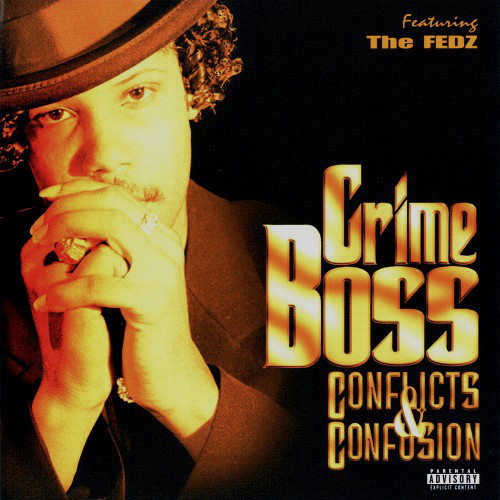“Now this the type of shit you do a drive-by to, get high to”
For a prominent Southern rap artist from the 1990’s there is surprisingly little information about Crime Boss out there, and much of what exists is contradictory or pure conjecture. I’ve seen different first and last names, different cities of origin, and different claims about whether or not he’s still around today. The one thing everybody agrees about is that he released two albums with Suave House Records in 1996 and ’97, with “Conflicts & Confusion” being the more commercially successful of the two. The fact that a music video exists for “Please Stop” also seems to back up the assertion it was released as a single off the album.
What strikes me about the song is that other than his drawl and use of slang like “trill” (which matches up with the claim he’s from Houston — since that’s where Suave House is based I tend to believe it) he’d easily fit into the G-Funk rap scene of the West coast. Perhaps it won’t surprise you to learn then that “Please Stop” and a large number of the tracks on this album are produced by Oakland’s own E-A-Ski, responsible for many Cali classics in the 1990’s and beyond. My favorite from this album other than the lead single is “Get Mine,” which honestly would pass for a Death Row posse track from Tha Dogg Pound without a second thought if you just let it ride.
This might also be responsible for why Crime Boss seemed to vanish off the radar after his tenure with Suave House came to an end. As enjoyable as the pounding bass and piano of E-A-Ski tracks like “Close Range” was, they also came to define Crime Boss to such a degree that he had a hard time establishing his own sound without him. The closest he gets to going his own direction is on the Roger Tausz laced “Chemical Imbalance” featuring labelmate 8Ball (of 8Ball & MJG). I like how Boss depicts his mental breakdown verbally. “Inside fo’ walls is the only place I feel safe/escape — illegal substance is my getaway.”
It shouldn’t come as a surprise that MJG also has a memorable cameo on the Tausz laced track “Warning.” Suave House artists supported each other to the fullest, a formula that helped build up their fan base in a way that No Limit and Swishahouse followed to the heights of success.
I usually like to give you an update on where an artist who made a seminal album is today, but Crime Boss lives up to the title of “Conflicts & Confusion” in unintentional ways. One source says he was arrested in the 1990’s on unspecified charges, found incompetent to stand trial, and held at a state mental hospital until he was deemed competent again. Owing not only to a lack of citation for these claims but a lack of specifics (what were the charges, did he take a plea, did he serve time) I consider the whole story “sus.” The album however is not. Crime Boss raps with a chip on his shoulder, and until you hear a hundred emcees that don’t have it, it doesn’t necessarily occur to you how valuable that is. His swagger elevates topics that have been tread-worn thin by similar acts, and the production is far above the average for the time. I sincerely hope this review leads the real Crime Boss or someone close to him to clear up all the misleading information about him online and tell us the real story of this overlooked Southern rap veteran.

